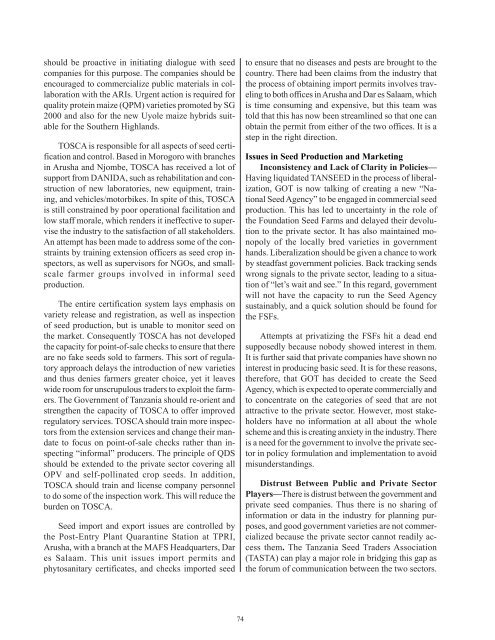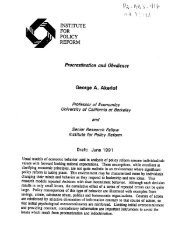An Action Plan for Developing Agricultural Input Markets in Tanzania
An Action Plan for Developing Agricultural Input Markets in Tanzania
An Action Plan for Developing Agricultural Input Markets in Tanzania
Create successful ePaper yourself
Turn your PDF publications into a flip-book with our unique Google optimized e-Paper software.
should be proactive <strong>in</strong> <strong>in</strong>itiat<strong>in</strong>g dialogue with seed<br />
companies <strong>for</strong> this purpose. The companies should be<br />
encouraged to commercialize public materials <strong>in</strong> collaboration<br />
with the ARIs. Urgent action is required <strong>for</strong><br />
quality prote<strong>in</strong> maize (QPM) varieties promoted by SG<br />
2000 and also <strong>for</strong> the new Uyole maize hybrids suitable<br />
<strong>for</strong> the Southern Highlands.<br />
TOSCA is responsible <strong>for</strong> all aspects of seed certification<br />
and control. Based <strong>in</strong> Morogoro with branches<br />
<strong>in</strong> Arusha and Njombe, TOSCA has received a lot of<br />
support from DANIDA, such as rehabilitation and construction<br />
of new laboratories, new equipment, tra<strong>in</strong><strong>in</strong>g,<br />
and vehicles/motorbikes. In spite of this, TOSCA<br />
is still constra<strong>in</strong>ed by poor operational facilitation and<br />
low staff morale, which renders it <strong>in</strong>effective to supervise<br />
the <strong>in</strong>dustry to the satisfaction of all stakeholders.<br />
<strong>An</strong> attempt has been made to address some of the constra<strong>in</strong>ts<br />
by tra<strong>in</strong><strong>in</strong>g extension officers as seed crop <strong>in</strong>spectors,<br />
as well as supervisors <strong>for</strong> NGOs, and smallscale<br />
farmer groups <strong>in</strong>volved <strong>in</strong> <strong>in</strong><strong>for</strong>mal seed<br />
production.<br />
The entire certification system lays emphasis on<br />
variety release and registration, as well as <strong>in</strong>spection<br />
of seed production, but is unable to monitor seed on<br />
the market. Consequently TOSCA has not developed<br />
the capacity <strong>for</strong> po<strong>in</strong>t-of-sale checks to ensure that there<br />
are no fake seeds sold to farmers. This sort of regulatory<br />
approach delays the <strong>in</strong>troduction of new varieties<br />
and thus denies farmers greater choice, yet it leaves<br />
wide room <strong>for</strong> unscrupulous traders to exploit the farmers.<br />
The Government of <strong>Tanzania</strong> should re-orient and<br />
strengthen the capacity of TOSCA to offer improved<br />
regulatory services. TOSCA should tra<strong>in</strong> more <strong>in</strong>spectors<br />
from the extension services and change their mandate<br />
to focus on po<strong>in</strong>t-of-sale checks rather than <strong>in</strong>spect<strong>in</strong>g<br />
“<strong>in</strong><strong>for</strong>mal” producers. The pr<strong>in</strong>ciple of QDS<br />
should be extended to the private sector cover<strong>in</strong>g all<br />
OPV and self-poll<strong>in</strong>ated crop seeds. In addition,<br />
TOSCA should tra<strong>in</strong> and license company personnel<br />
to do some of the <strong>in</strong>spection work. This will reduce the<br />
burden on TOSCA.<br />
Seed import and export issues are controlled by<br />
the Post-Entry <strong>Plan</strong>t Quarant<strong>in</strong>e Station at TPRI,<br />
Arusha, with a branch at the MAFS Headquarters, Dar<br />
es Salaam. This unit issues import permits and<br />
phytosanitary certificates, and checks imported seed<br />
74<br />
to ensure that no diseases and pests are brought to the<br />
country. There had been claims from the <strong>in</strong>dustry that<br />
the process of obta<strong>in</strong><strong>in</strong>g import permits <strong>in</strong>volves travel<strong>in</strong>g<br />
to both offices <strong>in</strong> Arusha and Dar es Salaam, which<br />
is time consum<strong>in</strong>g and expensive, but this team was<br />
told that this has now been streaml<strong>in</strong>ed so that one can<br />
obta<strong>in</strong> the permit from either of the two offices. It is a<br />
step <strong>in</strong> the right direction.<br />
Issues <strong>in</strong> Seed Production and Market<strong>in</strong>g<br />
Inconsistency and Lack of Clarity <strong>in</strong> Policies—<br />
Hav<strong>in</strong>g liquidated TANSEED <strong>in</strong> the process of liberalization,<br />
GOT is now talk<strong>in</strong>g of creat<strong>in</strong>g a new “National<br />
Seed Agency” to be engaged <strong>in</strong> commercial seed<br />
production. This has led to uncerta<strong>in</strong>ty <strong>in</strong> the role of<br />
the Foundation Seed Farms and delayed their devolution<br />
to the private sector. It has also ma<strong>in</strong>ta<strong>in</strong>ed monopoly<br />
of the locally bred varieties <strong>in</strong> government<br />
hands. Liberalization should be given a chance to work<br />
by steadfast government policies. Back track<strong>in</strong>g sends<br />
wrong signals to the private sector, lead<strong>in</strong>g to a situation<br />
of “let’s wait and see.” In this regard, government<br />
will not have the capacity to run the Seed Agency<br />
susta<strong>in</strong>ably, and a quick solution should be found <strong>for</strong><br />
the FSFs.<br />
Attempts at privatiz<strong>in</strong>g the FSFs hit a dead end<br />
supposedly because nobody showed <strong>in</strong>terest <strong>in</strong> them.<br />
It is further said that private companies have shown no<br />
<strong>in</strong>terest <strong>in</strong> produc<strong>in</strong>g basic seed. It is <strong>for</strong> these reasons,<br />
there<strong>for</strong>e, that GOT has decided to create the Seed<br />
Agency, which is expected to operate commercially and<br />
to concentrate on the categories of seed that are not<br />
attractive to the private sector. However, most stakeholders<br />
have no <strong>in</strong><strong>for</strong>mation at all about the whole<br />
scheme and this is creat<strong>in</strong>g anxiety <strong>in</strong> the <strong>in</strong>dustry. There<br />
is a need <strong>for</strong> the government to <strong>in</strong>volve the private sector<br />
<strong>in</strong> policy <strong>for</strong>mulation and implementation to avoid<br />
misunderstand<strong>in</strong>gs.<br />
Distrust Between Public and Private Sector<br />
Players—There is distrust between the government and<br />
private seed companies. Thus there is no shar<strong>in</strong>g of<br />
<strong>in</strong><strong>for</strong>mation or data <strong>in</strong> the <strong>in</strong>dustry <strong>for</strong> plann<strong>in</strong>g purposes,<br />
and good government varieties are not commercialized<br />
because the private sector cannot readily access<br />
them. The <strong>Tanzania</strong> Seed Traders Association<br />
(TASTA) can play a major role <strong>in</strong> bridg<strong>in</strong>g this gap as<br />
the <strong>for</strong>um of communication between the two sectors.

















